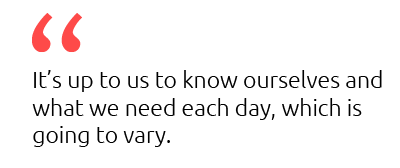Productivity. For the modern worker, it’s more than a buzzword — it’s a lifestyle. There are productivity role models, apps to help you work smarter, strategies to help you feel more engaged at work, and a plethora of services designed to eliminate the inefficient habits of unproductive people, like grocery shopping or leisurely eating.
But is all of this really making us more effective employees? In our new blog series, “Worksmart,” we’re putting so-called productivity “best practices” to the test to see what really works and what advice you can forgo.
Eating Through Lunch Could Hurt Your Performance
First up — lunch. What was formerly a sacred hour for friends and food has become an unfortunate casualty of our nine-to-five (or seven-to-seven) hustle. Recent studies have shown, however, that working through lunch can negatively impact performance.
In an interview with NPR, Kimberly Elsbach, a professor at the University of California, Davis Graduate School of Management, who studies workplace psychology, explained the correlation between breaks and the type of non-linear work most of us do: “Staying inside, in the same location, is really detrimental to creative thinking. It’s also detrimental to doing that rumination that’s needed for ideas to percolate and gestate and allow a person to arrive at an ‘aha’ moment.”
Most of us know this instinctively yet struggle to step away when tasks start piling up. The reasons why vary. Guilt, perceived judgement, and stress can all keep us tied to our desks.
Could just a 30-minute break and the productive, refreshed mind it promises be enough to make up for lost time? For one week, our test team took a real lunch break every day to find out.
Putting Lunch Breaks to the Test

We put together a team of employees from across our go-to-market teams including sales people, enablement, marketing, and management to understand how lunch breaks — defined as a minimum of 30 minutes away from work — impact productivity. Let’s examine preconceptions.
For Alison Mittelstaedt, an account executive, lunch breaks are useful breathing space away from a busy day. “A lot of the time, I have demos, calls, or other meetings during the typical lunchtime,” she explained. “But I try to take a 30- to 45-minute lunch break whenever I can to get fresh air.”
But she was an outlier within our group. Marissa Gbenro, Sr. Content Marketing Manager, Elena Edington, Sr. Digital Communications Manager, and Lucas Welch, Sr. Director of Content and Communications, all identified as desk-eaters and were wary of change.
Like many modern workers, Lucas and Elena feared “wasting working hours” — that leftover tasks would bleed into evenings, cutting into home life.
Marissa voiced similar productivity concerns. Despite having read multiple articles that say the opposite is beneficial, lunch is a chance to “power through” work for Marissa.
Growth Enablement Manager Devin Daniels also worried that a forced lunch break would cut into what he calls “opportunity time” — pockets of the day dedicated to tackling new projects. He added, “I understand the value prop of recharging the creative juices, but I’m skeptical that it outweighs that extra time.”
With perspectives ranging from optimistic to eyebrows raised, we headed into the test. One week later, here’s what we discovered.
When It Worked: Better Collaboration and Spirits. When It Didn’t: A Sense of Lost Time.
“Spoiler: human beings aren’t robots.”
So began our post-experiment reflections. But Lucas, quoted above, isn’t wrong. The majority of our participants listed at least one benefit from a real lunch break, with most recognizing that there were in fact cognitive, emotional, and workplace benefits to giving our brains a break.
A lunch outing, for example, helped Lucas’ team “get to know each other better” which he anticipates will “lead to easier collaboration and team efficiency.”
For Alison, “The days outside in the fresh air enjoying lunch with coworkers” left her feeling “more energetic, positive, and ready to enjoy outings after work.” 
Marissa agreed. While sitting at our lunch tables on the first day of the experiment, she noticed she was “surrounded by engineers” enjoying a midday repose. “If some of the smartest people I’ve ever met do this, there must be something to this whole ‘break’ thing,” she said. The realization was followed with “some much-needed self-reflection about my working style.”
 Others, like Elena, had more complicated reactions. “Some days I felt stressed stepping away; other days I felt rejuvenated and inspired,” Elena said. For her, a lack of consistency became an opportunity to personalize the “lunch break” concept: “It’s up to us to know ourselves and what we need each day, which is going to vary.”
Others, like Elena, had more complicated reactions. “Some days I felt stressed stepping away; other days I felt rejuvenated and inspired,” Elena said. For her, a lack of consistency became an opportunity to personalize the “lunch break” concept: “It’s up to us to know ourselves and what we need each day, which is going to vary.”
As for Devin? “Scheduled lunch breaks just don’t really do it for me,” he said. The hour away from work led to an “itch” of tasks left undone. While he recognized the science behind the benefits of taking a lunch break, forcing one got “zero stars” from Devin.
The variations in our results also revealed a key point: What works for one person may not work for you. And though there is clear research to support a lunch break of some sort, integrating one into your workflow must be done in a way that’s mindful of your own needs, emotions, and priorities.
From what we’ve learned, here are four best practices to making a lunch break work for you.
How to Have a Successful Lunch Break for a More Productive Afternoon
- Don’t force it. Our needs and priorities change every day. If you’re in the zone, keep going, even if it’s through lunch. That said …
- Be mindful. Check in with yourself and find moments to reflect — is what you’re doing more important than your mental health? Will it be worth feeling burned out? Thirty minutes is a small price to pay for emotional wellbeing.
- Step away from your desk. Staying in the same place doesn’t allow the brain to fully detach from work, and the temptation to keep going can interrupt your break.
- Remember to relax. Detaching gives your senses a chance to recharge, leading to more positive and respectful interactions. Your coworkers and your mood will thank you.
And when in doubt, Lucas offers a sage piece of advice: Time away to eat, joke, talk, read, walk, whatever, helps us connect with ourselves, other people, and the world around us, which will undoubtedly make work more enjoyable and lead to better performance.
Happy lunching.




